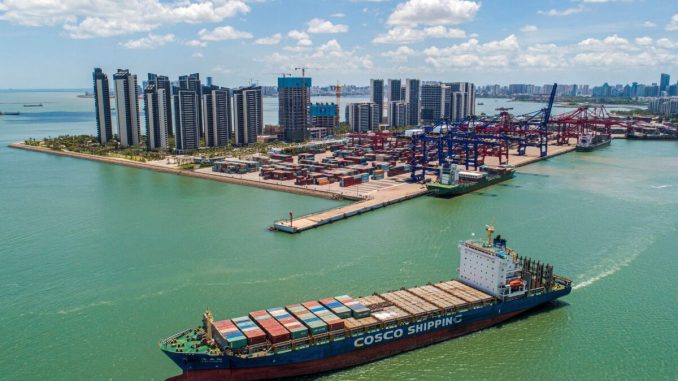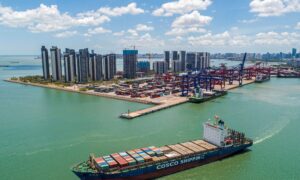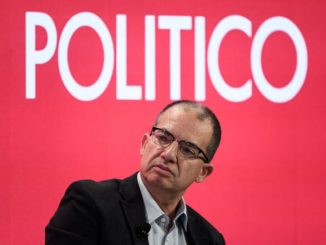

In June last year, while pushing its national security law in Hong Kong, China announced a master plan to build Hainan, the country’s southern island province, into a free trade port by 2025.
Local authorities released a progress report recently, claiming that the institutional framework of a free trade port system has been “basically established,” and Hainan will become another Hong Kong when the facilities become “more mature.”
Hainan Free Trade Port Must ‘Adhere to Socialism’
When announcing the master plan at a press briefing on June 8 of last year, Liu Cigui, the Party chief of Hainan, stressed that unlike many existing free trade ports in the world that are under a capitalist system, the Hainan port would be under “the system of socialism with Chinese characteristics.”
“From any ideological perspective, we will not allow any moves that jeopardize national security or hamper [China’s] socialist construct,” Liu said.
Hainan Can’t Become Another Hong Kong
Chinese authorities also formulated 60 key policies to attract foreign investment. However, China experts pointed out that the regime’s plan to turn Hainan into another Hong Kong is just a pipedream.
Current affairs commentator Liu Ruishao told The Epoch Times that the Chinese Communist Party (CCP ) is repeating its past mistakes.
“The Hainan Free Trade Port is actually not much different from the free trade zones promoted by Beijing in the past. In a place that lacks the rule of law, it is almost impossible for a free trade port to grow. What has happened with the Shanghai and Shenzhen Free Trade Zones? Neither has become a success,” Liu said.
Frank Xie, a professor of Business Administration at the University of South Carolina-Aiken, believes that the Hainan Free Trade Port is a joke, as it is in no position to reproduce the success Hong Kong experienced before the former British colony was strangled by Beijing.
In an interview with The Epoch Times Professor Xie pointed out that Hainan’s trade policies are basically in line with those of Hong Kong, such as no tariffs being charged on imports or exports. However, for a free trade port to be successful requires a lot more than zero tariffs.
“Hong Kong was successful because Hong Kong once had a well-established legal system,” he said. “The SAR used to enjoy freedom of speech, and judicial independence, which was a very successful social system left behind by the United Kingdom. The Chinese Communist Party has basically destroyed Hong Kong, destroyed its status as a free trade port. And now it plans to build another free trade port [in Hainan]. Isn’t that a joke?”
According to Professor Xie, Hainan will be separated from the rest of the country, which means residents from other provinces will have to pass customs to enter the island. But despite the separation, there are several issues with the CCP’s plan to turn Hainan into a free trade zone, he said.
“What kind of legal system will be adopted in Hainan? Who will arbitrate if there are legal disputes? Does Hainan have independent arbitration rights? If there is a dispute awaiting judgment at the Hainan Supreme Court, will the local supreme court have the final say or can the lawsuit be further taken to China’s Supreme Court? If the latter is true, Hainan is still a province of China, not a free port,” Professor Xie said.
Another potential problem is currency, Professor Xie said.
“If products from all over the world can be freely imported and exported, which currency should be used for trading?” he asked.
“If China’s yuan is used and allowed to be freely converted into other currencies, Hainan will become a money laundering paradise for the CCP’s senior officials,” Professor Xie said.
“In that case, the yuan will undergo a rapid and substantial depreciation. The current exchange rate of the U.S. dollar to the Chinese yuan is about 1:6. But we may see the yuan depreciate to 1:30 or even 1:60. China will have to adopt two exchange rates and a dual track system,” he added.
Professor Xie pointed out that the decision makers involved are very ignorant as they try to reproduce Hong Kong’s success in Hainan without understanding what had made Hong Kong so successful.
In conclusion, Professor Xie said: “The key prerequisite for Hong Kong’s prosperity was an independent judicial system, including a fair legal system for trade. The CCP is unclear of this basic fact, nor is it willing to recognize it. It thinks a free trade zone is as simple as reducing tariffs. I would say they are dreaming and talking nonsense.”






Be the first to comment